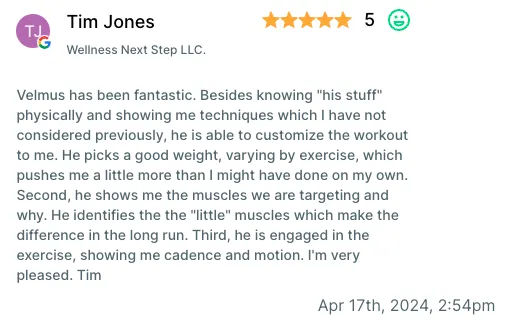
Does This Sound Familiar...
You already know what to do:
Eat more healthy whole-food
Create a new healthy habit in 21 days
Train your body __ min. 3 times a week
Sleep 7-9 hours to have great energy
Drink more water daily
A daily walk to clear your mind
So why don’t you do it?
The Secret Is Daily Action And Accountability
Many clients come to us knowing what to do but struggling to follow through. They’re frustrated by broken promises—”I’ll start tomorrow,” “I’ll be better next week”—and have tried numerous programs without success. THE KEY TO OUR CLIENTS’ SUCCESS WAS FOLLOWING A PLAN THAT WAS PERSONALIZED AROUND YOUR GOALS, LIFESTYLE, AND COMMITMENT.
ARE YOU READY TO BE THE NEXT WELLNESS-SEEKER?
Over the past decade, I’ve empowered countless busy women through my Personalized Health Coaching Programs. My mission extends beyond guiding clients to lose weight; I focus on instilling foundational principles that ensure lasting success. Remarkably, many individuals maintain their weight loss and remain in the best shape of their lives more then three years after completing my program.
Wellness-Seekers:
Are Ready to Reclaim Your Health Without the Burnout.
Let’s cut to the chase: You’re a woman who’s mastered her career, but somewhere along the way, your health took a backseat. Maybe your doctor gave you a nudge (or a shove) after your last checkup. Or perhaps you’re just tired of feeling stuck in a cycle of quick fixes, guilt, and diets that leave you hungry and frustrated.
Sound familiar? You’re not alone.
I work with women exactly like you—driven, ambitious, and ready to finally prioritize their well-being without the extremes. These women have spent years building success only to realize their energy, confidence, or joy has quietly slipped away.
Here’s the good news: You don’t need another restrictive plan or a 5 AM gym grind. What you do need is a sustainable, science-backed approach that fits your busy life. No guilt trips. No one-size-fits-all rules. Just real strategies that work for you.
That’s why I’m inviting you to my FREE training: 4-Part Blueprint For Change. In this training, you’ll learn:
How to fuel your body without counting calories or sacrificing time.
Simple ways to rebuild energy and confidence—even with a packed schedule.
Why “quick fixes” fail (and what to do instead).
This isn’t about perfection. It’s about progress that lasts.
👉 Ready to start? Click The Link Below to watch it’s 100% free, and you’ll walk away with actionable steps to feel like you again.
You’ve already proven you can achieve big things. Let’s make your health one of them.
Join Our Personalized Health Coaching Program

Hi, I'm Vilmos Bond, Founder and Health Coach at Wellness Next Step.
Knowing what to do and doing it consistently are two very different things. That’s why we don’t just hand you a meal plan at Wellness Next Step and wish you luck. Instead, we support, coach, guide, and hold you accountable daily. We’re with you each step of the way, helping you overcome any challenges you face.

Personalized Coaching
Our one-on-one coaching sessions are designed to address your unique challenges and create a personalized weight loss plan that fits your lifestyle and goals.
Nutrition Guidance
Our expert coach will provide you with meal plans guidance and valuable tips to make healthier food choices that support your weight loss journey.
Fitness Workouts
We offer diverse workout routines to keep you engaged and motivated, helping you build strength and burn calories effectively.
Mindfulness Training
Learn techniques to manage stress, emotional eating, and cultivate a positive mindset for long-term success.
Stop Dieting. Start Living
This isn’t just another program—it’s a movement for women ready to break free from endless cycles of deprivation. Say goodbye to starvation diets, guilt trips, and short-term fixes. This is about forever change.
What’s a Wellness-Seeker?
She’s a woman who:
🔥 Craves energy, not exhaustion.
🔥 Builds habits, not restrictions.
🔥 Fuels her life, not just her body.
🔥 Chooses confidence, not comparison.
No quick fixes. No BS.
Transform your relationship with food (bye-bye, guilt!).
Master sustainable habits that stick for life.
Unlock unstoppable energy to crush your goals.
Embrace movement because you want to, not because you have to…
That’s Ready to Take Control of Their Health
It doesn’t matter how many times you’ve tried in the past with little to no success.
Success Stories from Women Like You
"Before joining Wellness Next Step, I struggled with yo-yo dieting and could never stick to a routine. The personalized coaching and support from my coach changed everything. I’ve lost and kept the weight off, and I finally feel confident in my body!"
Sarah’s Transformation
"Wellness Next Step helped me change my habits in a way that worked for my busy life. I’m no longer overwhelmed by strict diets or intense workouts—I’ve found a healthy balance that I can maintain for the long term."
Rachel’s Journey




Check your email for confirmation email, if you don't see in you inbox
check your spam or promotions folder

